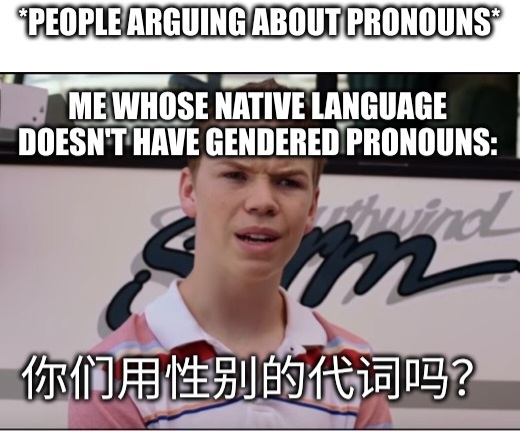this post was submitted on 30 Aug 2023
991 points (95.9% liked)
Memes
50730 readers
883 users here now
Rules:
- Be civil and nice.
- Try not to excessively repost, as a rule of thumb, wait at least 2 months to do it if you have to.
founded 6 years ago
MODERATORS
you are viewing a single comment's thread
view the rest of the comments
view the rest of the comments

Hi. The caption in the image reads 你们用性别的代词吗?. Literally, it translates to "you (pl.) (你们) use (用) gendered (性别的) pronouns (代词) [question particle] (吗)?" As you have guessed, it means "Do you (pl.) use gendered pronouns?".
However, the way this sentence is worded is pretty awkward and gives off the impression that it was written by a machine translator. It sounds as if the speaker actually did not know whether they use gendered pronouns or not, while it's supposed to sound like that the speaker just learned that they use gendered pronouns and is asking for confirmation.
A much better way to say this would be 你们用的代词有性别?, which means "The pronouns you use are gendered?". Note that the translation is not "Are the pronouns you use gendered?" (Yes, I did not use a 吗. It is for yes/no questions, but only when the equivalent question in English begins with a Do, Will, Have, Are, etc. should you use a 吗.)
Edit: An exception to the 吗 rule I mentioned just occurred to me, namely "How are you?" (你好吗?), but I would say that's due to a difference between how Chinese and English greetings work. 你好吗? is actually closer to "Are you good?".
Wow, this is awesome! Thank you so much! I finally understand why some questions have 吗ma and others don’t need it.
Duolingo is great because it’s free, but I don’t think it replaces talking to actual native speakers.
Can I ask you something? In duolingo, it rarely “tells” you the definitions of things, and leaves you to suss it out from context, but one I’ve been struggling with is duoshao多少.
In context it also appears to signify a question, but only questions regarding numbers. I think I’m missing something in my understanding of it though.
An example it gives is 他的电话号码是多少,which, to my understanding is like, “your phone number is what?” Or “What is your phone number?”
Is my understanding correct? If I wanted to ask how many apples you have, would I use 多少?
I've also had a similar experience when learning Japanese with it.
多少 roughly translates to either "how many" or "how much," but it can also be used when asking for almost any kind of numerical answer. Your understanding of 他的电话号码是多少? is almost correct. It means "what is his phone number?" If you want to ask someone how many apples they have, you would say 你有多少颗苹果? or 你有几颗苹果?. (几 is "how many.") Another few example sentences:
It's ok if you don't understand some of the words I used. Only after I typed those sentence out did I realize that some of them might be too difficult, so don't be intimidated by them.
Wow, thanks again, this is really helpful! 谢谢你!I definitely don’t know some of those words, but I’m gonna save your comment for reference as I continue learning.